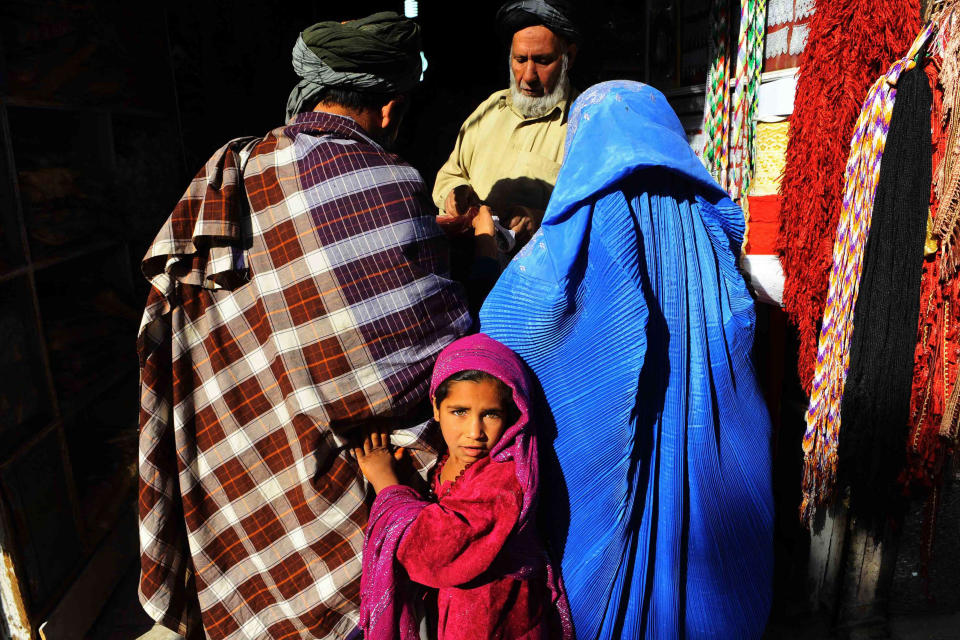Blinken makes surprise visit to Afghanistan after Biden announces U.S. troop withdrawal
- Oops!Something went wrong.Please try again later.
- Oops!Something went wrong.Please try again later.
- Oops!Something went wrong.Please try again later.
Secretary of State Antony Blinken landed in Afghanistan on Thursday for a surprise visit less than 24 hours after President Joe Biden announced the full withdrawal of U.S. forces from the country by Sept. 11.
While in Kabul, Blinken met with Afghan President Ashraf Ghani and Abdullah Abdullah, chairman of the country's High Council for National Reconciliation, as well as prominent members of Afghan society.
"I wanted to demonstrate with my visit the ongoing commitment of the United States to the Islamic Republic and the people of Afghanistan," Blinken said as he met Ghani in Kabul. "The partnership is changing, but the partnership is enduring."
Blinken also met with American soldiers and paid tribute to their sacrifice.
Around 2,300 U.S. troops have lost their lives and more than 20,000 have been wounded since the U.S. toppled the ruling Taliban in 2001 after it refused to hand over Osama bin Laden, the leader of Al Qaeda and the architect of the terror attacks of Sept. 11, 2001. More than 100,000 Afghan civilians have also been killed or injured since 2009, when the United Nations began systematically documenting the impact of the war on civilians.

Ghani said Thursday that he respects the U.S. decision to withdraw and expressed gratitude for the sacrifice U.S. forces had made fighting "shoulder to shoulder" with Afghan troops.
U.S. efforts to reassure the Afghan leadership in the wake of the announcement were "heartening to us," he said, "as is your visit today."
Blinken and Ghani "discussed our shared investment in Afghanistan and the importance of preserving the gains of the last 20 years, especially in building a strong civil society and protecting the rights of women and girls," State Department spokesperson Ned Price said.
Blinken said that America had "succeeded" in achieving the objective it set out nearly 20 years ago — Al Qaeda had been significantly degraded and bin Laden "brought to justice."
Download the NBC News app for breaking news and politics
Still, some observers and critics say the withdrawal not only imperils U.S. counterterrorism efforts, but that it also endangers Afghanistan's fragile democracy and the gains made by women and ethnic and religious minorities.
On Wednesday, CIA director William Burns told the Senate Intelligence Committee that "when the time comes for the U.S. military to withdraw, the U.S. government’s ability to collect and act on threats will diminish. That’s simply a fact."
Naheed Farid, a member of Afghanistan's parliament, told reporters she was "very pessimistic" about the future of her country. Farid was among half a dozen prominent Afghans, mainly women, who met Blinken at the U.S. Embassy on Thursday.

Under the Taliban, women's and girls' lives were strictly controlled. Many were not allowed to work outside the home, appear in public without an all-encompassing body covering, and a male escort. Many minority communities also suffered at the hands of the Taliban, which espouses a strict and austere version of Islam.
Mir Rahman Rahmani, speaker of the Afghan Parliament, expressed concern about the withdrawal. He said that while the country's people want to see foreign forces leave, “the conditions are not met for that to happen yet.”
"It is possible that Afghanistan turns into another civil war or becomes a haven for international terrorist organizations," he warned in a speech.
The Taliban also said they were unhappy with Biden's decision. In a statement Thursday, the group said the withdrawal delay was a "clear violation" of a deal they reached with the U.S. last year.
"As the agreement is being breached by America, it in principle opens the way," it said, for the group "to take every necessary countermeasure."
Under former President Donald Trump, the U.S. agreed that foreign troops would leave Afghanistan by May 1 in exchange for the Taliban's commitment to both disavow Al Qaeda and other terrorist groups, as well as enter into peace talks with an Afghan delegation.
As part of the agreement signed last year, the militants committed to a reduction in violence. But fighting has continued despite the ongoing talks, and civilian casualties and political assassinations have surged.
Intra-Afghan negotiations have continued for months in Doha, Qatar. Turkey announced earlier this week that representatives of both the Afghan government and the insurgent group would meet in Istanbul later this month to accelerate the discussions.
Biden announced Wednesday that all U.S. troops would withdraw from Afghanistan in time for the 20th anniversary of the 9/11 terrorist attacks. He said that the U.S. will continue to provide assistance to Afghan forces, and diplomatic and humanitarian work in the country.
Blinken acknowledged Thursday that the U.S. was waiting on a "definitive" response from the militants about their participation in the Istanbul talks. He also warned the militants that they had a choice to make if they wanted international recognition.
Before arriving in Kabul, Blinken and Secretary of Defense Lloyd Austin met with NATO officials in Brussels, with NATO Secretary-General Jens Stoltenberg confirming the alliance would also be withdrawing.
NATO currently has around 10,000 troops in Afghanistan, more than 7,000 of whom are non-U.S. forces.

